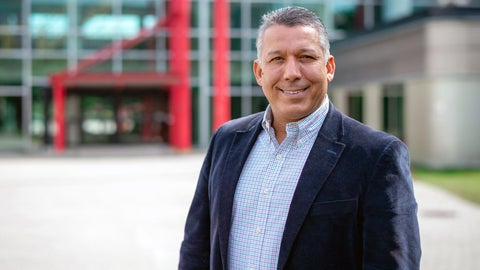
Waterloo’s computer science school grows its reputation built on quality of faculty and students
It’s all about reputation, which is all about quality.
It was the reputation of the University of Waterloo’s computer science school that attracted Raouf Boutaba to a faculty position 23 years ago. Today, he is the director of the David R. Cheriton School of Computer Science, a school that punches far above its weight in international rankings and draws top students and faculty researchers from around the world.
Boutaba’s academic career started in Europe, and after arriving in Canada, he took positions in Montreal and Toronto. But Waterloo drew him in because of its reputation and quality of research.
“For my own research, I needed to work with the type of students that Waterloo had,” Boutaba says, who has a background in electrical and computer engineering as well as computer science. “Waterloo had the students who were building software systems and so I thought that this was the best place in Canada for me to be.”
The school consistently shows up in national and international rankings.
Waterloo computer science is in the top 25 out of more than 1,400 universities around the world, according to the Quacquarelli Symonds (QS) World University Rankings. In the Maclean’s 2022 rankings of Canadian universities, computer science at Waterloo was number one for the second year in a row. With more than 4,000 undergraduate students and 400 graduate students, it’s also a big program in terms of enrollment.
Beyond the numbers
But, as Boutaba says, it’s not just about numbers.
“Quality of education and research is our goal. If you shine in your education and research, then students and faculty will want to come.”
Waterloo definitely attracts the best and the brightest. The school gets so many applications that the average entry grade is “phenomenally high,” Boutaba says. “That creates a virtuous circle that reinforces itself over time,” he adds. “Having good undergraduate and graduate students helps us attract good faculty and that in turn helps to attract good students.”
Boutaba says there isn’t a single “secret ingredient” for building such a world-renowned computer science school. Instead, “there are many ingredients in play together and tied to each other.”
The co-op education component that mixes academics with work experience is one well-known ingredient. “There is a very high demand from industry to get our co-op students to spend their work terms in these companies,” Boutaba says. Many of those students end up with permanent job offers even before they graduate.
“Many of them end up in leadership positions in academia and industry,” which adds to Waterloo’s global reputation, he says.
History of innovation
A major factor in making computer science at Waterloo a success is that the university encourages and facilitates interactions with industry. Long before it was fashionable in academia, entrepreneurship was in the DNA of the University of Waterloo. It started with the support of industry and forward-thinking government officials who were concerned that Canada was falling behind as technology advanced after the Second World War.
“Today, the interaction with industry provides our faculty the ability to access real-world problems,” Boutaba says. “Our faculty work with a wide variety of companies, sometimes doing research contracts and often creating genuine collaborations with corporate staff.”
That out-of-the-box thinking and entrepreneurial spirit thrived in Waterloo’s computer science school from its inception, Boutaba says.
It drew people like Wes Graham and Don Cowan, who won funding to bring the IBM 360/75 to Waterloo in the 1960s. At the time, it was the biggest computer in Canada and the same model that was used by NASA to send astronauts to the moon. “That really helped put Waterloo on the map,” Boutaba says.
Those same computer science pioneers started to build software that became entire companies. Watcom, a company that Graham co-founded, was the first of many spinoff companies from the university.
Entrepreneurial spirit
The spirit of entrepreneurship thrived in the computer science school alongside its growth in other parts of the university. It led to liberal intellectual property policies that give researchers ownership of their patents. The result was the growth of more than two dozen successful spinoff companies, including big corporations such as OpenText and Maplesoft.
In that sense, computer science at Waterloo seeded the growing Waterloo Region technology hub that we see today, Boutaba says.
Computer science has come a long way in the 55 years since the school was established, but it has no intention of sitting on its laurels.
Today computer science students and faculty members are involved in every area of computer science research, from artificial intelligence and quantum computing to blockchain and bioinformatics. Boutaba hopes the school’s reputation will continue to rise along with the quality of its research and education.
“We hold a top spot in the rankings for research and scholarship, and that’s important. But while being in the top 25 schools internationally is commendable, we are ambitious, and in the future, we hope to be in the top 20.”